Recent Startup Recipients
Below are ECU’s recent faculty startup award recipients. Learn more about the startup program.

Azeez Aileru
ailerua19@ecu.edu
Foundational Sciences, SODM
Recent epidemiological studies suggest over 300 million people worldwide will be affected with glucose intolerance, dyslipidemia, insulin resistance, type 2 diabetes, and hypertension by the year 2021. Among the pathological reasons are the excessive accumulations of fat in adipose and non-adipose tissues. Obesity is more predisposed to insulin resistance and hypertension. While there are publications that show the association between obesity and insulin resistance and hypertension, the mechanism that links obesity to these health disparities is not understood. Because there is a close relationship between obesity and insulin resistance leading to type 2 diabetes, hypertension and cardiovascular dysfunction, my interest is to study how nucleotide transcription during lipogenesis interfere with insulin and renin-angiotensin signaling pathways. These findings could lead to an effective therapeutic agent for the cardiometabolic syndromes.

Rashmita Basu
basur19@ecu.edu
Public Health, BSOM
My research examines the economics of aging with a particular interest in the areas of long-term care delivery and financing. My work also investigates the importance of healthy lifestyle behavior in prevention of chronic illness, social determinants of health, and the value of health economic evaluation in public health and health care decision-making. In my research, I attempt to identify causal effects of policies and individual choices that directly or indirectly impact health outcomes, health care access, costs and utilization. As a health economist, I am always fascinated about demonstrating value of health care resources utilized towards promoting efficiency of care delivery and well-being of people living within the communities.

Natasha Bell
bellna19@ecu.edu
Engineering, CET and Water Resources Cluster
The National Academy of Engineering has identified providing access to clean water, managing the nitrogen cycle, and improving urban infrastructure as three of its 14 Grand Challenges for Engineering in the 21st century. My research focus is on the development of resilient environmental remediation strategies that inform decision-making and policies within the water-energy-food nexus. Specifically, this research investigates the efficacy of and biogeochemical processes underlying green infrastructure and ecological technologies, including constructed wetlands and subsurface bioreactors, to remediate urban and agricultural nonpoint source pollutants. The ultimate goal of this research is to understand water quality and quantity issues facing water users in eastern N.C. and beyond, investigate potential barriers that may limit the adoption of bioremediation technologies, and quantify ecosystem services that these technologies provide.

Juan Beltran-Huarac
beltranhuaracj19@ecu.edu
Physics, THCAS
My research examines the molecular interaction of engineered nanoconstructs with biological entities and uses this mechanistic understanding to develop and implement safe-by-design nanoformulations to treat cancer, enhance the resolution of MRI scans, detect disease-related chemical analytes, and assess toxic responses. At the core of this research is exploring bottom-up miniaturization strategies and physicochemical and biological characterization, followed by bioconjugation, dispersability and dosimetry so we can endow our nanoformulations with an extra degree of functionality. I also examine the effect of exogeneous magnetic fields on the activation of magnetic nanoformulations and the combined role to inhibit tumor progression. My work represents an intersection of nanomaterials science approaches, principles of physics and chemistry and theranostic tools. My ultimate goal is to respond to society’s need to provide cost-effective alternatives for diagnosis and therapy of cancer, powerful MRI contrast agents, and safe biosensors.

Linda Bolin
bolinl@ecu.edu
College of Nursing
My program of research focuses on primary and secondary prevention of cardiovascular disease. Specifically, I explore the multi-faceted influences on disease processes and how individuals self-manage their cardiovascular health. I explore variables across the lifespan that could possibly be determinants in cardiovascular health. In addition to exploring variables (e.g., diet, physical activity) that can impact cardiovascular disease, I explore biomarkers (e.g., cytokines) to further expand my goal of preventing/managing cardiovascular disease. As a Nurse Practitioner and a Biofeedback Provider, I incorporate novel interventions, such as the effect pace breathing on heart rate variability, to improve individuals’ overall cardiovascular health and quality of life. The use of biofeedback has allowed me to engage patients through actively measuring and improving their physiological functioning along with their cognitive understanding about the mind-body connection. I currently have projects that explore multifactorial and adjunctive treatment regimens with a focus on self-management of lifestyle changes.

Steven Brewer Jr.
brewers19@ecu.edu
Criminal Justice, THCAS
My research examines the nature and extent of mass shootings in the United States. The foundation of this research is the development of the most accurate single-source comprehensive longitudinal mass shootings database in the United States. I am currently examining historical records of mass shootings. Specifically, I identify and analyze spatial data of the shooting events, motive and background of the shooter, and victim characteristics. The overall goal of this research is to facilitate public discussions on gun violence and mass shootings and improve related policy using evidence-based research.

Nick Broskey
broskeyn19@ecu.edu
Kinesiology, HHP and East Carolina Diabetes and Obesity Institute
My primary research interest is how exercise can prevent or ameliorate metabolic diseases such as obesity and type 2 diabetes through improvements in skeletal muscle mitochondria. My current area that I am focusing on is known as the developmental origins of health and disease hypothesis, which postulates that exposure to certain environmental influences during critical periods of development and growth in utero may have significant consequences on an individual’s short- and long-term health. To this end, my collaboration interests include lifestyle interventions (diet and/or exercise) during pregnancy and how they can influence the health of the infant.

John Cavanagh
cavanaghj19@ecu.edu
Biochemistry and Molecular Biology, BSOM
My research is in antimicrobial resistance. The World Health Organization notes that multidrug-resistant bacteria (“superbugs”) are one of the most serious public health threats. Bacteria are acquiring resistance to all known antibiotics, and the rate of resistance development is much faster than pharmaceutical companies can introduce new treatments. Antibiotic-resistant bacteria cause more than 2,000,000 infections annually in the U.S., resulting in ~23,000 deaths. Currently, these infections cause ~$20 billion in direct health care costs and ~$35 billion in lost productivity. We have developed therapeutics that overcome multiple antibiotic resistance mechanisms and restore the effectiveness of countless antibiotics that are currently inactive. Our technology works across multiple bacterial species, but very importantly, it works against the three most “critical” bacterial pathogens as defined by the World Health Organization.
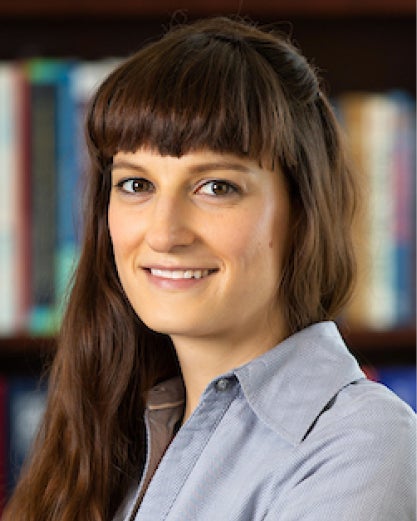
Ashley Burch
burchas15@ecu.edu
Health Services and Information Management, Internal Medicine
Cardiovascular disease (CVD) is consistently ranked as the leading cause of death globally. Social determinates – including race, health literacy, poverty, health care access, housing and food security, and rurality – have a prominent role in the management and outcomes of patients with CVD. My recent work has focused on the use of large, nationally representative datasets (e.g., HCUP, BRFSS) to identify actionable determinates of health disparities and develop scientifically informed, targeted interventions to improve outcomes for patients with CVD and its precursors. I currently serve with an international group of female scientists and physicians on the Women’s Cardiac Health Initiative. The mission of this initiative is to bring awareness to women-specific issues in cardiovascular health, promote the inclusion of female patients in cardiovascular clinical trials, and encourage the use of sex specific data in the creation of CVD treatment guidelines.

Alan Christensen
christensenal19@ecu.edu
Psychology, THCAS
My research involves the study of medical regimen adherence and behavioral self-management among patients with chronic medical problems, particularly chronic kidney disease, head and neck cancers, diabetes, and hypertension. A longstanding, underlying feature of my research, has been a conceptual and methodological focus on the interactive relations among individuals and the social, environmental, and clinical contexts within which and manage their own health and health care. A primary objective of my work has been to identify psychosocial attributes that help to explain the wide variability in regimen adherence, patient satisfaction, and clinical outcomes observed among patients with chronic disease. My own empirical work and conceptual model in this area has demonstrated that the “match” or degree of symmetry between health-related beliefs, preferences, and attitudes held by patients and the role that patients are asked to play in regard to their own self-management or treatment delivery is an important determinant of patient outcomes.

Alessandro Didonna
didonnaal21@ecu.edu
Anatomy and Cell Biology, BSOM
The overarching goal of my research consists in elucidating the mechanisms underlying central nervous system (CNS) autoimmunity, with an emphasis on disease progression and neurodegenerative phenotypes. For this purpose, the lab routinely employs in vivo model of neuroinflammation in combination with cutting-edge “omics” technologies and the latest approaches for genetic manipulation in mice. A consistent part of my research efforts is focused on multiple sclerosis (MS) and its animal model experimental autoimmune encephalomyelitis (EAE). In fact, MS is perhaps the most paradigmatic autoimmune disease and provides an excellent framework to investigate the interactions between the immune and nervous systems in health and disease. In parallel to my work on MS, I am also interested in elucidating the role played by the immune compartment in the etiopathogenesis of disorders there were once considered purely neurodegenerative such as Alzheimer’s disease and Parkinson’s disease. In particular, I am keen to characterize the contribution of inflammatory stress to protein misfolding in the brain. I also intend to explore the possible involvement of peripheral and CNS resident immune cells in modulating disease susceptibility and clinical manifestations.
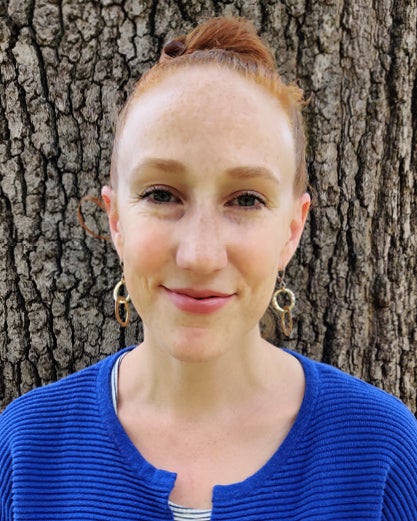
Helen Dixon
dixonhe19@ecu.edu
History, THCAS
My research explores the ancient Mediterranean world through the culture, history, and impact of the Phoenicians in the first millennium BCE. While Phoenicians are remembered as inventors of the alphabet and neighbors to biblical Israel, my research examines other ways their religious, political, social, and art historical innovations shaped the ancient landscape. I utilize archaeological excavations, mortuary inscriptions, museum study, and archive work in Lebanon, Syria, Cyprus, Israel, the West Bank, Greece, Turkey, and Jordan to convey how Phoenicians and their neighbors shaped and negotiated their social identities in life and in death. I maintain secondary publishing interests in both digital humanities applications to the study and teaching of the ancient world, and the increasingly urgent ethical challenges of the international antiquities trade.
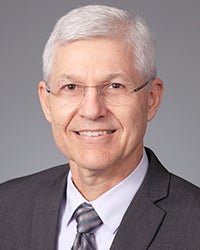
Saulo Geraldeli
geraldelis19@ecu.edu
General Dentistry, SODM
Globally, between 60 to 90 percent of schoolchildren and nearly 100 percent adults have tooth decay, often leading to pain and discomfort. Traditional approach to treat such condition relies on aggressive hand-tactile based surgical removal of the decayed dental structures. The drawbacks of this approach are, especially in deep decayed teeth, exposure of the pulp (nerve and blood vessels), weakening the tooth to behave as an organ, and unaffordable dental treatment plans. My research explores the development of a socially responsible therapeutic clinical approach to minimize removal of decayed tooth structures. Specifically, we are developing bioactive-antimicrobial bioglass nanoparticles capable of penetrating deep areas of the decayed tissues, such as enamel and dentin, aiming to promote biomimetic recover of their structural strength allowing reliable tactile judgement and less tissue removal.

Ted G. Graber
grabert19@ecu.edu
Physical Therapy, CAHS
One seemingly inevitable consequence of the effect of age on our bodies is the graduated deterioration of physical function and exercise capacity. We can suffer from sarcopenia resulting in an age-related loss of muscle mass and strength, sometimes to the point of disability. While there are many potential physiological systemic etiologies that may contribute to sarcopenia, frailty and the loss of physical ability, the adverse effect of age on muscle tissue itself is a major driver of these conditions. My research investigates the effect of age on the neuromuscular system, the underlying molecular mechanisms responsible for functional loss as we get older, and potential therapies to extend the relatively disease and disability-free portion of life known as healthspan.

Qingxin He
heq18@ecu.edu
Economics, THCAS
Aircraft flights collect information for weather forecasts by recording air temperature, relative humidity, air pressure and wind along their flight path. With significantly fewer planes in the sky during the COVID 19 pandemic, forecasts of these meteorological conditions have become less accurate, and the impact is more pronounced as forecasts extend further out in time. Inaccuracy in weather forecast adversely impacts the economy. The project aims to evaluate the economic impact of inaccurate weather forecast in varieties of production sectors, starting from the agriculture yields, and followed by the interruption in electricity generation.

Nadine Heck
heckn19@ecu.edu
Coastal Studies, ICP
I am a geographer with a specialization in marine conservation and natural resource management. I study how the governance and management of marine protected areas and fisheries shape the achievement of desired conservation and management outcomes. In addition, I study how managers and users within fisheries and marine protected areas respond to impacts of climate change.

Nic Herndon
herndonn19@ecu.edu
Computer Science, CET
Brief description of research: Machine learning algorithms have become mainstream across multiple domains. However, these models are not accurate when applied to a different problem than the ones they were trained for. My research explores methods to increase the accuracy of different machine learning models on real life problems, such as, but not limited to, identifying correlations between environmental factors and regions of DNA responsible for adaptation, automatically approximating the area of the asphalt damage on roads using images collected from a low flying drone, spam filtering of emails written with characters from multiple alphabets, predicting cancer recurrence from large images of tissue scans, and identifying the most similar face given a photo of an individual with collapsed face for dental reconstruction.

Guy Iverson
iversong18@ecu.edu
Health Education and Promotion, HHP
My research focuses on the relationship between water quality and human land-use change, with an emphasis on better understanding how wastewater and stormwater management affect the availability of nutrients, sediments, pathogenic microorganisms, and emerging contaminants (e.g., pharmaceuticals and personal care products, GenX and other “forever” chemicals). Wastewater and stormwater management can act as a source or transport mechanism to water resources, which provide important ecosystem services in North Carolina including water supply, recreation and tourism, aquatic habitat, and/or aesthetical value (i.e., “high quality” waters). Elevated concentrations of these pollutants may result in water quality degradation or water use impairment, potentially translating into socioeconomic damages. My research aims to analyze the spatiotemporal variability in pollutant concentration and mass transport to shallow groundwater and surface water resources from human land uses. Additionally, my research studies the efficacy of best management practices designed to attenuate these pollutants by facilitating biogeochemical processes that improve water quality. The overlap between these two research areas provides important information necessary for improving management of water resources, which has broader implications for environmental and public health such as providing North Carolina’s citizens with cleaner water.

Carol Johnston
johnstonc19@ecu.edu
Human Development and Family Science, HHP
The general goals of my research are to explore how types of and changes in family structure, ecological instability, and sociocultural factors shape the lives and trajectories of adolescents and young adults. More than two-thirds of children in the U.S. live with two married parents, but those children who do not may experience a variety of family structures and multiple changes in their family structure over the course of childhood and adolescence. The experience of their parents entering and exiting marriages and cohabiting partnerships can directly shape their development and set the stage for their adult lives (Afifi et al., 2015; Weaver & Shofield, 2015). My research examines these links and what they mean for young people, families, and society at large (Cherlin, 2009).

Aaron Kipp
kippa19@ecu.edu
Public Health, BSOM
My research interests are broadly in the social and behavioral factors that affect access, retention, and adherence to care for various marginalized populations, including people with HIV and Tuberculosis. This includes measurement of HIV stigma and its role as a barrier to retention in care and treatment adherence; measurement of TB stigma and its role as a barrier to retention in care and treatment adherence; and trying to ascertain the impact of marijuana use, including motivation for use, on retention in care for people living with HIV. Since the COVID-19 pandemic began, I have also been involved in a Pitt county community-based study of COVID-19 prevention and testing.

Peter Koch
kochp19@ecu.edu
Anatomy and Cell Biology, BSOM
My research is focused on understanding basic biological and pathological mechanisms underlying ectodermal dysplasias (ED), a group of developmental diseases that affect various organs, including the skin and skin appendages (e.g. hair, nails, teeth). The ED we study dramatically affect the quality of life of patients and can even result in death during early childhood. Although many ED gene mutations have been identified, we still do not understand the disease mechanisms. Our main investigative tools are adult human stem cell systems that enable us to generate and study different cell types carrying ED mutations. Our research is aimed at understanding these diseases at the molecular level and to develop novel therapeutic concepts for the treatment of ED.

Maranke Koster
kosterma20@ecu.edu
Anatomy and Cell Biology, BSOM
Research in my laboratory is aimed at investigating the pathological mechanisms that underlie ectodermal dysplasias, developmental disorders that are characterized by abnormal development of ectodermally-derived tissues and organs. Specifically, we focus on ectodermal dysplasias caused by autosomal dominant mutations in the transcription factor TP63, a key regulator of epidermal and appendage development. Patients affected by TP63-related ectodermal dysplasias suffer from severe skin and cornea erosions. Our lab uses in vitro and in vivo models to identify the cellular and molecular mechanisms that are responsible for the tissue fragility that underlies these erosions. Understanding the pathological mechanisms may ultimately lead to the development of therapeutic strategies for these patients.
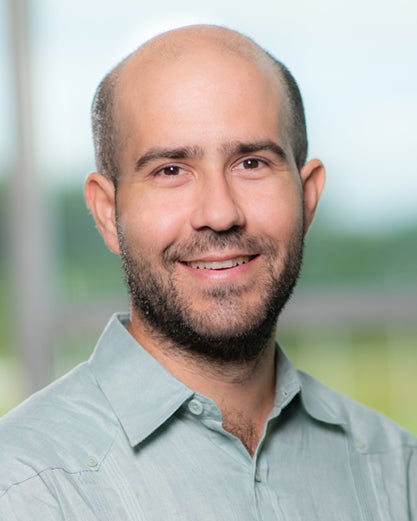
David Lagomasino
lagomasinod19@ecu.edu
Coastal Studies, ICP
Coastal regions around the world are home to the majority of humankind and provide a unique set of ecosystem services that support local-to-global economies, create habitat for many endangered species, and help regulate the global climate. But many of these regions are undergoing rapid and irreversible changes because of natural and human-related disturbances much of which is hidden from street-level views. Therefore, satellite imagery and other remotely sensed information can be used to understanding where, why, and how coastal areas around the world are being degraded. Dr. Lagomasino combines Earth observations and ground measurements to quantify changes to the coast and recognize the causes of those changes. His research links remotely sensed spatial data directly with stakeholders to address exposure and sensitivity issues for coastal/wetland management and ecosystem valuation. His goals are to provide meaningful information that will better inform coastal management practices while also inspiring students and the community to become environmental stewards to help sustain our coastal resources.

Rich Lamb
lambr19@ecu.edu
Special Education, Foundation and Research Methods, COE
My research focuses on the identification and measurement of cognitive processes engaged while using technology in educational environments. Specifically, I address the use of technology and explore how technology shapes the biopsychosocial aspects of learning and technology’s relationship to learning across the lifespan, with populations ranging from infant to geriatric. Current projects consist of: understanding how virtual environments can be used to mitigate the effects of childhood trauma; understanding the role that VR plays in developing summary and argumentative writing in science; and the use of machine learning and artificial intelligence to classify student outcomes from data collected in virtual environments. My work is interdisciplinary and draws from cognitive psychology, behavioral neuroscience, psychometrics, and computer science. The purpose of my research is to translate basic behavioral neuroscience and psychological research into educational practice.

Carol Massarra
massarrac19@ecu.edu
Construction Management, CET
My research interest lies in the areas of resilience to natural hazards with particular emphasis on post-hurricane performance of residential buildings. My resilient construction research primarily focuses on: spatial and non-spatial data-based (statistical) natural hazards damage modeling and associated field damage data collection; natural hazards loss modeling; and building vulnerability index and associated vulnerability maps. I approach my research from the perspective of the builder (supply), homeowner (demand) and building code authority (regulation). My research outcomes help individuals and communities make cost effective decisions that increase resiliency and sustainability, especially in vulnerable coastal areas. My long-term research interests are to bring more statistical research to the construction and engineering fields to better understand post-hurricane performance of buildings and other built infrastructure.

Kirk Miller
millerjam19@ecu.edu
Sociology, THCAS
My research agenda is eclectic but unified by a focus on the ways that social inequality impacts justice in process and outcome. Much of my recent work is concerned with explaining patterns of protests of police and police response to protests of police in the United States in the aftermath of George Floyd’s murder in 2020. Other recent or current work is concerned with documenting patterns of the adoption of racial, gender, and other diversity-themed courses in a national sample of criminal justice and criminology bachelor’s degree programs; racial/ethnic patterns in the use of police dog sniffs pursuant to vehicle searches in traffic stops; examining how trust in police influences patterns of reporting sexual assault among college students by race/ethnicity; courtroom dynamics of civil eviction proceedings in a special housing court during COVID; and strategies for avoiding and managing police shakedowns (“la mordida”) in Mexico tourist areas.

Jim Morley
morleyj19@ecu.eduu
Biology, THCAS
I’m a fisheries ecologist and I conduct research on how marine and estuarine species are impacted by human use of coastal ecosystems. The influence of humans on coastal regions are broad and include climate change, fishing, and the development of aquaculture. I use two major approaches in my work. The first involves using statistical models to better understand how marine species respond to climate and weather patterns. The second is using marine acoustics technology to make observations of species habitat use and behavior. The ultimate goal of my work is to provide marine policy makers with data to inform decisions, and to further the management of coastal resources within an ecosystem framework.
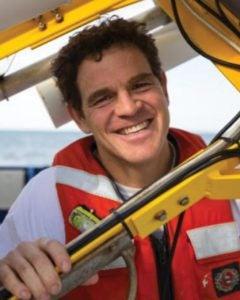
Mike Muglia
mugliam@ecu.edu
Coastal Studies, ICP
My scientific interests include understanding variability in position and transport of western boundary currents; the complex confluence of different shelf water masses; shelf and deep ocean exchange processes; meridional overturning circulation linkages between western boundary currents and deep western boundary currents; and applying his oceanographic knowledge to developing renewable ocean energy solutions. My ongoing research efforts include understanding high-frequency variability in the cyclonic shear zone of the Gulf Stream with HF radars; quantifying the variability in the available hydrokinetic energy resource from the Gulf Stream for the state of NC; Gulf Stream, Mid Atlantic Bight, South Atlantic Bight, Chesapeake Bay Outflow, and Slope Sea water mass dynamics off the NC coast; and, developing ocean renewable energy solutions with multidisciplinary teams.
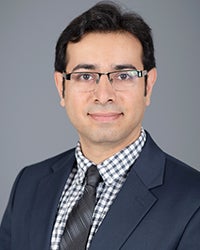
Mostafa Namian
namianm19@ecu.edu
Construction Management, CET
The focus of my research is construction safety with an emphasis on human behavior aspects. My research includes three main interrelated subjects: hazard recognition; safety risk perception; and safety training enhancement of construction workers. Hazard recognition and safety risk perception are two leading indicators of the safety performance of workers and two objective safety training outcomes. I use emerging technologies such as eye-tracking, virtual reality, and augmented reality to experimentally examine novel approaches to improve the safety behavior of construction workers. In addition, I aim to explore more-effective safety training methods that facilitate learning new skills through imitation and engagement of trainees. I believe my efforts, along with many other enthusiastic researchers, would save thousands of construction workers’ lives.

Siddharth Narayan
narayans19@ecu.edu
Coastal Studies, ICP
My research program focuses on using numerical and spatial modeling to quantify the physical, economic and social benefits of natural ecosystems like marsh wetlands, mangroves and reefs for reducing risks from coastal flooding to people and property. My research work combines coastal numerical modeling with spatial analysis and other tools to understand how, where and to what extent coastal ecosystems can act as nature-based solutions for adapting to coastal hazards. I collaborate with colleagues across academic institutions and work closely with governments, international banks, industry and NGOs to inform coastal engineering and risk management policy, financing and practice.

Yoo Min Park
parky19@ecu.edu
Geography, Planning and Environment, THCAS
My research lies at the intersection of geography, public health, environmental health, exposure science, and data science. I examine the effect of environmental stressors on human health and diseases and health disparities using geo-referenced data (e.g., human movement pattern data from GPS tracking), geographic information science (GIS) techniques, spatio-temporal data analysis methods, and spatial statistics. In particular, I develop novel geospatial methods for assessing exposure to air pollution and health risks to enhance an understanding of the effect of exposure to air pollution on health. My research also uncovers complex socio-spatial mechanism behind environmental justice and health disparities. I hope to see my research have a direct impact on promoting health equity and improving the well-being and health of all individuals including underserved people.

Jacob Petersen-Perlman
petersenperlmanj19@ecu.edu
Geography, Planning and Environment, THCAS
I am a water resources geographer who investigates political institutions and organizations responding to global environmental change, specifically the changing distribution and increasing degradation of water resources. Within these interests, I study security, governance and management aspects of water resources planning, and the mechanisms and processes that foster natural resources cooperation and mitigate conflict.

Ciprian Popoviciu
popoviciuc18@ecu.edu
Technology Systems, CET
Sensing and actuating instrumentation opens significant new opportunities for domain specific and multidisciplinary research, for new knowledge delivery mechanisms, and for the improvement of the health of communities. The Internet of Thing (IOT) has emerged as a major enabler for research, education, and community management. My research focuses on the development of new sensors and the development Environmental Sensing Data Network (ESDN) to enable researchers, educators, and communities to easily deploy and manage sensors and to access the data and insights of interest.

Michelle Ratliff
ratliffm19@ecu.edu
Microbiology and Immunology, BSOM
My primary research interest is in the age-related changes that occur in the hematopoietic progenitor cells, particularly in the hematopoietic stem cells (HSCs). A common change associated with aging is induction of a chronic, low-grade inflammation. Because of this, we are interested in studying the differences found under chronic inflammatory settings, regardless of age, to identify changes specifically related to inflammation and those related to aging, which extends our interest into changes induced by chronic inflammation throughout the human lifespan, including cancer, chronic infections, and autoimmune diseases. These studies will allow for identification of potential therapeutic targets that can improve immune responses for anyone with chronic inflammation.

Jason Raupp
rauppj14@ecu.edu
Maritime Studies, History, THCAS
I am a maritime archaeologist interested in culture change and adaptation through technological and organizational innovation. My primary research focuses on the ways in which standardization of industrial practices and technologies affected operations of early American fisheries. Other areas of specialization include World War II battlescapes in the Pacific region; the value of citizen science and public engagement to archaeological research; and digital imaging of archaeological sites.

Suzanne Manizza Roszak
roszaks19@ecu.edu
English, THCAS
I specialize in modern and contemporary multi-ethnic American literature with an emphasis on Latinx and indigenous literatures. Special projects that I am currently working on focus on cross-cultural expressions of allyship in fiction, activist children’s literature, and literary depictions of well-meaning white womanhood.

Swati Surkar
surkars19@ecu.edu
Physical Therapy, CAHS
My research focuses on developing a novel, multidisciplinary scientific framework for improving neurorehabilitation outcomes for children and young adults with cerebral palsy and other neuromotor disorders. Specifically, I am interested in identifying neural and mechanical correlates of movement dysfunction and neural predictors of functional recovery, as well as explore the effects of novel therapies in changing the brain and behavior relationships. My work involves the interaction of pediatric neurorehabilitation, neuroimaging, biomechanical, and electrophysiological methods. The long-term goal of my research is to improve neurorehabilitation practices and outcomes.

Eric Wade
wadee21@ecu.edu
Coastal Studies, ICP
My research explores decision-making and behaviors in natural resources, primarily in coastal and marine systems. I am interested in understanding the drivers and feedbacks of individual and collective decisions and how stakeholders navigate socio-ecological change. At the same time, my research also aims to understand the influence and interaction of formal and informal institutions on the decision-making strategies of stakeholders. I primarily explore these topics interdisciplinary, drawing from theories in social psychology, behavioral economics, and sociology.

Matthew Walenski
walenskim21@ecu.edu
Communication Sciences and Disorders, CAHS
Language is a uniquely human capacity. However, language can be impaired, whether due to brain injury or disease, psychiatric disorder, or atypical development, leading to often profound consequences for physical and mental health and reduced quality of life. Understanding and ameliorating these issues depends on our knowledge of the structure of language, the processes by which it is produced and comprehended in real time, and the structure and function of the brain regions that subserve language. My research examines language and its relation to memory systems and their roots in the brain, with a focus on the comprehension and production of words and sentences. I favor the use of temporally sensitive experimental methods to probe language processing as it unfolds in real time. I study these issues in healthy adults and in adults with acquired neurogenic disorders. Ultimately, clear characterizations of how particular aspects of atypical or impaired language follow from specific profiles of brain dysfunction may lead to improved or novel treatment interventions and positive outcomes for affected individuals.

Daniel Xu
xuh19@ecu.edu
Political Science, THCAS
I have worked on several areas of health disparities and health policy. One is related to factors that affect birth outcomes such as infant mortality rate, especially in rural communities. My research aims to identify areas where policy and program interventions can improve birth outcomes. The second area of my research interests include ways to increase access to health services in rural areas such as telehealth. My third area of research is in public health policy examining the role of public health in population health while evaluating the effectiveness of health policy and regulation and public health programs such as midwifery programs and Medicaid expansion.




